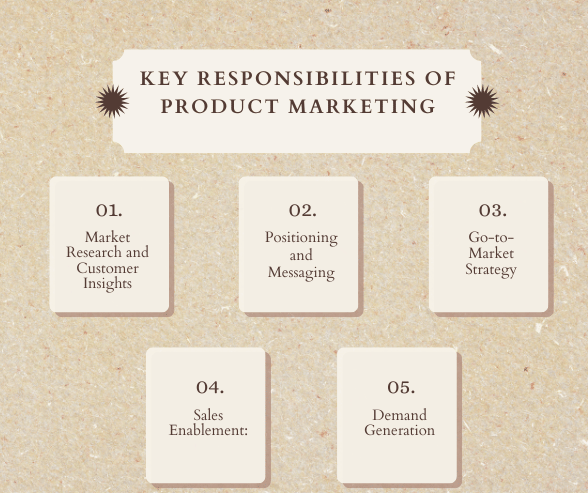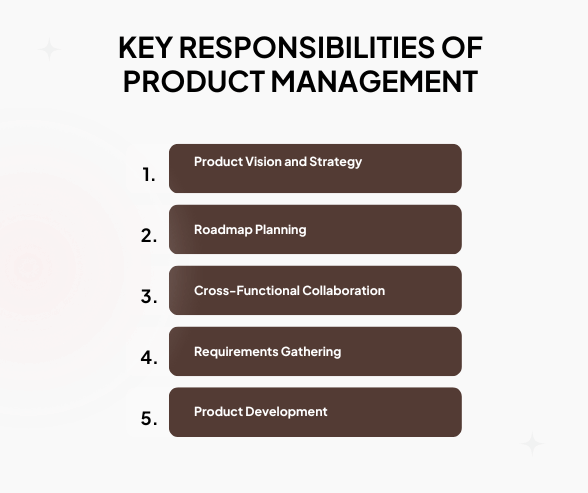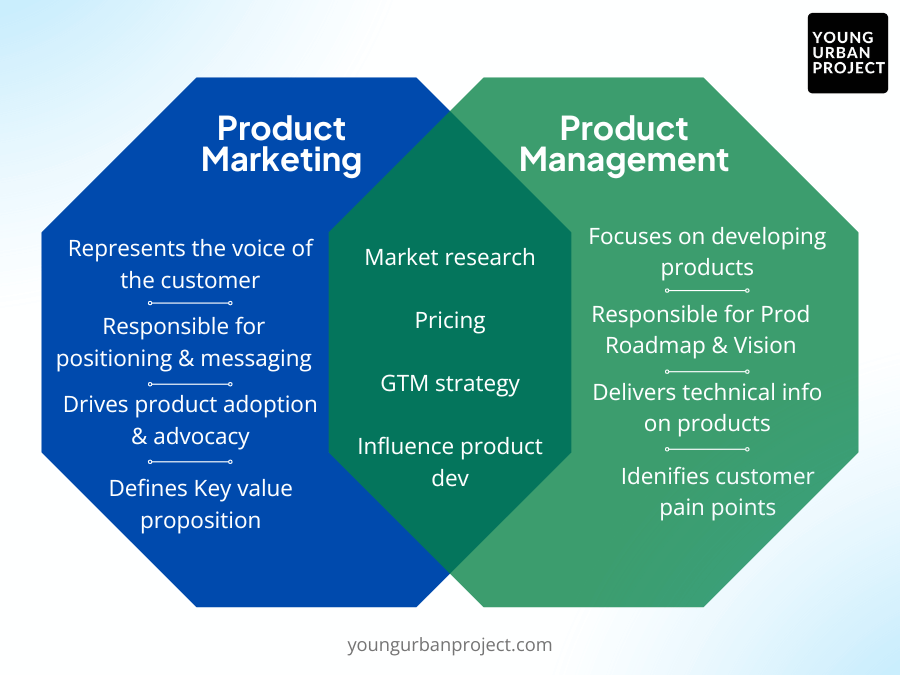For anyone aspiring to make a career in Product, there are two prominent options they will come across – Product Marketing and Product Management.
While both roles are integral to a product’s lifecycle, they have distinct responsibilities and require unique skill sets. This blog will help you explore product marketing and management nuances, offering a clear comparison between Product Marketing vs Product Management for a better understanding of their importance.
Table of Contents
What is Product Marketing?
Product marketing is a strategic function that involves promoting and selling a product to a specific target market. This role focuses on understanding customer needs, creating messaging that resonates with those needs, and driving demand for the product. Product marketers are responsible for positioning the product in the market, developing go-to-market strategies, and ensuring that sales teams have the tools and information to sell the product effectively.
Key Responsibilities of Product Marketing:

Product marketing involves a range of strategic activities aimed at ensuring a product’s success in the market. Here are the key responsibilities:
- Market Research and Customer Insights: Product marketers conduct extensive market research to understand customer needs, preferences, and behaviors. This involves analyzing market trends, studying competitors, and gathering data on target audiences. By understanding what drives customer decisions, product marketers can tailor their strategies to meet these needs effectively.
- Positioning and Messaging: Creating compelling messaging that communicates the product’s value proposition is crucial. Product marketers develop positioning statements that highlight the unique benefits and features of the product. This messaging is used across various marketing channels to ensure a consistent and persuasive narrative that resonates with the target audience.
- Go-to-Market Strategy: Developing and executing go-to-market plans is a core responsibility of product marketing. This includes planning product launches, coordinating with cross-functional teams, and ensuring that all aspects of the launch are aligned. A successful go-to-market strategy ensures that the product reaches the right audience at the right time with the right message.
- Sales Enablement: Product marketers equip sales teams with the necessary tools, resources, and training to sell the product effectively. This involves creating sales collateral such as brochures, presentations, and product demos. Additionally, product marketers often conduct training sessions to ensure that sales teams understand the product’s features, benefits, and competitive positioning.
- Demand Generation: Implementing marketing campaigns to generate interest and demand for the product is a key responsibility. Product marketers leverage various channels, including digital marketing, content marketing, social media, and events, to drive awareness and engagement. The goal is to attract potential customers and move them through the sales funnel.

What is Product Management?
Product management is a strategic and cross-functional role that involves overseeing the development and lifecycle of a product. Product managers are responsible for defining the product vision, setting the product roadmap, and working closely with engineering, design, and other teams to bring the product to life. They ensure that the product meets customer needs, aligns with business goals, and delivers value to the market.
Key Responsibilities of Product Management:

Product management is a critical role that involves overseeing a product from its initial concept to its launch and beyond. Here are the key responsibilities:
- Product Vision and Strategy: Product managers define the overarching vision and strategy for the product. This involves understanding market needs, and customer pain points, and aligning the product with the company’s broader business goals. They create a clear vision that guides the product’s development and sets the direction for its future growth.
- Roadmap Planning: Product managers are responsible for creating and maintaining the product roadmap. This roadmap outlines the planned features, improvements, and releases over time. It helps align the development team’s efforts with the strategic goals and ensures that the product evolves in a structured and prioritized manner.
- Cross-Functional Collaboration: Effective product management requires close collaboration with various departments, including engineering, design, marketing, sales, and customer support. Product managers act as the central point of contact, facilitating communication and ensuring that all teams are working towards the same objectives.
- Requirements Gathering: Collecting and defining product requirements is a key responsibility. Product managers gather insights from customers, stakeholders, and market research to identify the necessary features and functionalities. They then translate these requirements into detailed specifications that guide the development process.
- Product Development: Overseeing the product development process is a core duty of product managers. They work closely with engineering and design teams to ensure that the product is built according to specifications, meets quality standards, and is delivered on time. This involves regular reviews, feedback sessions, and adjustments as needed to keep the project on track.
Key Differences Between Product Marketing and Product Management

While both product marketing and product management are essential to a product’s success, they focus on different aspects of the product lifecycle and require distinct skill sets.
Focus Areas:
- Product Marketing: Centers on the market, customer needs, and demand generation. Involves creating messaging, positioning, and marketing strategies to promote the product.
- Product Management: Centers on the product itself, from development to launch and beyond. Involves defining the product vision, and roadmap, and overseeing the development process.
Key Skills:
- Product Marketing: Requires strong communication, market research, and analytical skills. Product marketers must be adept at crafting compelling messages, understanding customer needs, and driving demand through various marketing channels.
- Product Management: Requires strong leadership, strategic thinking, and technical skills. Product managers must be able to define product strategy, prioritize features, and collaborate with cross-functional teams to bring the product to life.
Metrics of Success:
- Product Marketing: Success is measured by market share, customer acquisition, and demand generation metrics. This includes tracking the performance of marketing campaigns, sales enablement efforts, and customer feedback.
- Product Management: Success is measured by product performance, customer satisfaction, and alignment with business goals. This includes tracking product usage, user feedback, and the successful implementation of the product roadmap.
Conclusion

Understanding the differences and similarities between product marketing VS product management (PMM vs PM) is essential for businesses looking to create successful products and drive growth. While product marketing focuses on promoting and selling the product, product management focuses on developing and managing the product throughout its lifecycle. Both roles are critical, and their collaboration ensures that a product not only meets customer needs but also achieves business objectives.
By clearly defining the responsibilities and skill sets required for each role, companies can better align their teams and create a more cohesive strategy for bringing products to market. Whether you are a product marketer or a product manager, recognizing the value of each role and working together will lead to more successful product launches and sustained business growth.
Young Urban Project offers comprehensive courses in both product marketing course and product management course, designed to equip you with the knowledge and skills needed to excel in these fields. Our courses are led by top industry mentors and provide practical, hands-on experience to ensure you are well-prepared for the challenges of a competitive market.
Join Young Urban Project to advance your career in product marketing or product management and become a key player in your career success.

